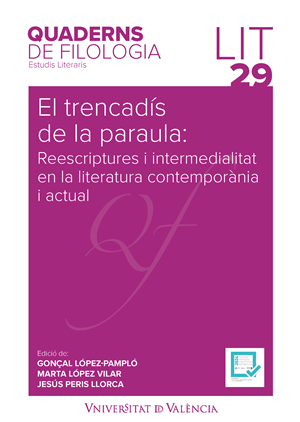Lolita Chakrabarti’s Palimpsestuous Re-vision of Ira Aldridge’s Acting as Othello in Red Velvet
DOI:
https://doi.org/10.7203/qdfed.29.28666Keywords:
palimpsest, Red Velvet (2012), Lolita Chakrabarti, British theatre history, Othello Abstract
Abstract
British actress Lolita Chakrabarti’s debut as a playwright in Red Velvet, shall be regarded as one of the most successful and sophisticated contemporary revisionary engagements with the history of both Victorian theatre and of Shakespearean theatrical performance. The play is a re-vision of the life of American actor Ira Aldridge (1807-1867)—the first Black classical actor to achieve distinction as an interpreter of Shakespeare on the British and continental stages—which focuses on his short-lived debut at Theatre Royal Covent Garden in 1833 as Othello. This article analyses the play’s metatheatrical strategies and playful engagement with the self-enclosed and self-referential nature of theatrical meaning to propose a critical reading that underscores the play’s overtly palimpsestic form and the complexities of its palimpsestuous intertextual engagements. It focuses, in particular, on its engagement with Othello’s interpretive traditions to imagine Aldridge’s performance of the tragic hero as modern, unconventional and ahead of his time.
 Downloads
Downloads
Downloads
Published
How to Cite
-
Abstract5
-
PDF1
Issue
Section
License
 Este obra está bajo una licencia de Creative Commons Reconocimiento-NoComercial-SinObraDerivada 4.0 Internacional.
Este obra está bajo una licencia de Creative Commons Reconocimiento-NoComercial-SinObraDerivada 4.0 Internacional.
Authors who publish with this journal agree to the following terms:
- Authors retain copyright and grant the journal right of first publication with the work simultaneously licensed under a Creative Commons Attribution License that allows others to share the work with an acknowledgement of the work's authorship and initial publication in this journal.
- Authors are able to enter into separate, additional contractual arrangements for the non-exclusive distribution of the journal's published version of the work (e.g., post it to an institutional repository or publish it in a book), with an acknowledgement of its initial publication in this journal.
- Authors are permitted and encouraged to post their work online (e.g., in institutional repositories or on their website) prior to and during the submission process, as it can lead to productive exchanges, as well as earlier and greater citation of published work (See The Effect of Open Access).




